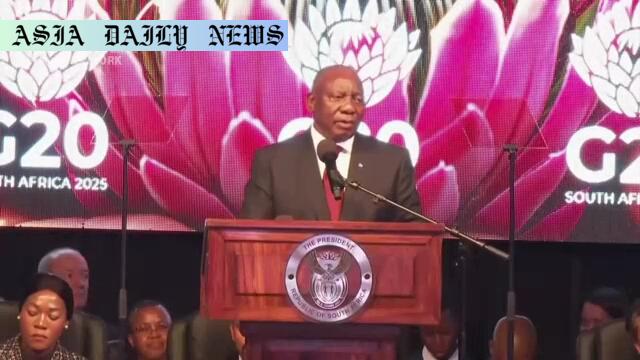G20 meeting begins in South Africa amid US absence, land law tensions.
The G20 foreign ministers’ meeting took place in South Africa, the first under the G20 framework on the continent.
US Secretary of State Marco Rubio skipped the event, criticizing South Africa’s new land expropriation law.
South Africa defends the law as a corrective measure for historical injustices from apartheid and colonial eras.
President Donald Trump responded by suspending US aid and pulling key US officials from future South Africa-hosted G20 forums.

Introduction: The G20 Meeting in South Africa
The Group of 20 (G20), comprising major global economies, convened its foreign ministers in South Africa this week. It marked a historic moment, being the first such meeting under the G20 framework to be hosted on the African continent. South African President Cyril Ramaphosa inaugurated the two-day summit, held in Johannesburg, emphasizing the event as a platform for fostering collaboration between African nations and the world. However, the absence of the United States’ top diplomat added a layer of tension to what Ramaphosa deemed an opportunity for unity.
Key Agendas: Challenges Facing Global Unity
The summit began with an impassioned speech from President Ramaphosa, drawing attention to pressing global challenges. Highlighted issues included geopolitical tensions, rising intolerance, armed conflicts, climate change, and persistent threats like pandemics. Energy and food insecurity, compounded by these crises, have created an increasingly fragile global coexistence, according to Ramaphosa. These themes set the tone for deliberations among the attending ministers, including representatives from Japan, China, and Russia.
US Absence and Its Implications
Conspicuously absent from the summit was US Secretary of State Marco Rubio. His decision followed last month’s enactment of a controversial South African law permitting land expropriation without compensation under certain conditions. The legislation aims to redress historical land ownership imbalances caused by colonialism and apartheid, where a white minority owns most private land. However, Rubio criticized the law as potentially destabilizing and unjust, prompting his withdrawal. This absence did not go unnoticed amid already strained US-South Africa relations.
US-South Africa Relations: A Widening Rift
US President Donald Trump compounded the diplomatic rift by issuing an executive order to suspend economic aid to South Africa earlier this month. This act, coupled with Rubio’s decision, signals a deepening division over policy and values between the nations. Furthermore, the US Treasury Secretary Scott Bessent has also been instructed not to attend the upcoming G20 finance ministers’ meeting in South Africa, marking a significant diplomatic stand-off.
South Africa’s Perspective: A Push for Justice
South Africa has defended its land expropriation law as a mechanism to correct historical injustices. Centuries of colonial occupation and decades of apartheid left profound inequalities that persist today, particularly in land ownership. The government insists the law is both necessary and fair, aimed at leveling the playing field and addressing economic disparities. Critics argue that such policies risk alienating international investors and may exacerbate economic challenges, but South African leadership views this as a necessary step toward equity and national healing.
Global Implications: The Role of the G20
The absence of the US at such high-level meetings raises questions about the role of the G20 as a platform for dialogue and collaboration. As global challenges like climate change and conflict grow in urgency, the G20 remains a critical forum for addressing them collectively. However, unresolved geopolitical tensions, including those seen in US-South Africa relations, threaten the group’s coherence. Despite these frictions, other nations present in South Africa continue to engage earnestly, seeking pathways to resolve shared issues.
Conclusion: Bridging a Divided World
The G20 foreign ministers’ meeting in Johannesburg underscores the complexities of global diplomacy in a divided world. While the absence of the United States casts a shadow over proceedings, it also amplifies the importance of fostering multilateral dialogue and collaboration. For South Africa, hosting the summit demonstrates its commitment to contributing to the global stage while addressing pressing domestic and regional inequalities. How the G20 navigates these challenges will shape its credibility and effectiveness in the years to come.
Commentary
Understanding the US Absence at the G20 Meeting
The decision by US Secretary of State Marco Rubio to skip the G20 meeting in South Africa is both symbolic and consequential. It highlights the ongoing strain in US-South Africa relations, particularly over South Africa’s new land expropriation law. This move, viewed by South Africa as a long-overdue corrective measure, has been met with criticism from the US, underscoring differing perspectives on governance and justice.
Impacts on Global Unity
The absence of the United States at such a pivotal gathering raises concerns about the strength and inclusivity of multilateral forums. In an increasingly interconnected world, addressing global challenges requires collective action and collaboration, making the US decision to disengage particularly significant. This absence not only weakens the discussions in Johannesburg but also signals a reluctance to engage with African nations on their terms.
A Moment of Reflection
South Africa’s hosting of the G20 meeting is a proud moment for the continent, offering an opportunity to bring African perspectives to global discussions. However, the broader implications of this event highlight the need for understanding and empathy in global relations. For the G20 to remain effective, member nations must bridge their divides and engage constructively, even when disagreements arise. Only then can such forums truly address the monumental challenges facing humanity today.


